The Belmont Forum goes to Brazil
Alexandra Fries · | Science Communication | 1 commentsI recently traveled to Sao Paulo, Brazil to help facilitate the Belmont Forum Plenary Meetings Week, November 6-10, 2017. The Belmont Forum is a group of funders that support international transdisciplinary research. This research provides knowledge for understanding, mitigating, and adapting to global environmental change. Prior to the meetings, IAN staff created materials for the event, including the agenda, a booklet, presentation templates, videos, a song, and banners.

The first day of the plenary meetings week was Americas Regional Info Day. The discussion identified priorities at the science-society-policy nexus that are of mutual interest in the Americas Region. There were presentations on how to overcome challenges and build opportunities for multi-national collaboration. The conversations also included how to strengthen linkages to global frameworks to leverage funding for Americas Regional priorities. Few countries in the Americas are officially part of the Belmont Forum, so this was also an opportunity for outside groups to learn about the Forum and see if they were interested in joining in the future.
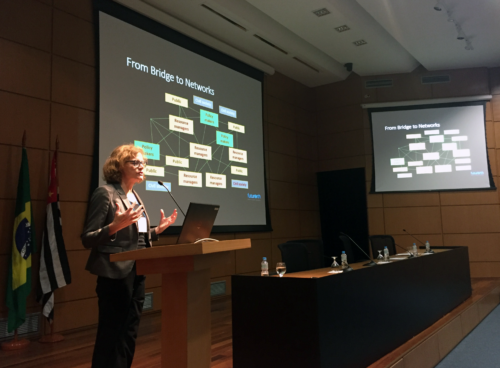
The second day had the Inter-American Institute for Global Change Research Session in the morning, and a closed Belmont Forum session in the afternoon. I attended the morning session, which focused on how to implement a flexible collaborative funding mechanism for the Americas. The Inter-American Institute (IAI) led most of the discussion, particularly Marcos Regis da Silva, who is the IAI’s new executive director.
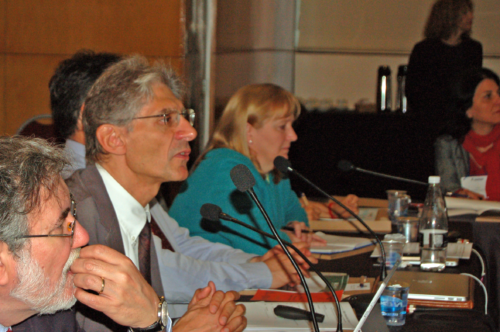
The two days that followed were the Open Plenary Sessions. These sessions covered a lot of material including the new Collaborative Research Actions (CRAs). Collaborative Research Actions are akin to a call for proposals, and are how the Belmont Forum funds projects. There are eight new CRAs that the Belmont Forum members proposed and discussed if they wanted to fund the calls or not. This was one of the most interesting parts of the meetings for me. It’s not often I get to see how funders decide where to put their money, and how much! For each call we went around the room and each country said if they were interested and how much money they intended to put in, anywhere from 400,000 Euro to 2 million Euro!

On the afternoon of the fourth day, I facilitated a session on stakeholder engagement, capacity building, and impact. All three of the topics had been raised several times already in the meetings, so it was good to have some time for the participants to reflect and try to brainstorm solutions to these questions. I had the participants write their answers to several questions on sticky notes, post them on the wall, and I summarized the ideas on the fly and we had some interesting discussions.
The four questions were:
- What should we as the Belmont Forum do to build capacity in transdisciplinary research?
- How do we facilitate stakeholder engagement throughout the lifetime of the Belmont Forum activities?
- How can we best gather outcomes from funded projects and synthesize the information?
- How can we improve coordination between different CRAs?

After the session, we enjoyed Bill’s song with a sing-a-long video that incorporated photos I took on the first day of the meetings.
The final day of the plenary meetings week was split into two concurrent events, The Food Security and Safety Workshop and the Global Funders Forum. I attended the Global Funders Forum to see more first-hand how funding decisions are made. A facilitation group called OpenIDEO ran this session and they started out with an icebreaker activity I enjoyed and may use in workshops in the future. In the activity, you have to partner up and take 1 minute to draw your partner. Then everyone puts their drawings up on the wall. It is such a fast and fun activity that it really helps for people who don’t really know each other.
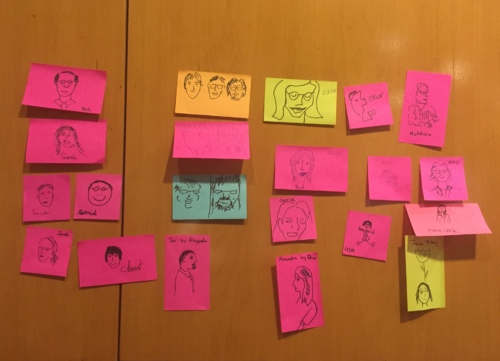
The rest of the day focused on how to build a Global Network of Funders, and bring in not only research funding agencies, but also foundations and development agencies. We also brainstormed what kind of project we would want to fund with the starting 100 million dollars. It was interesting to see how the funders work and think about funding mechanisms that will have the highest impact.
Overall, the Belmont Forum plenary meetings week was interesting, and I learned about new ideas and ways of thinking about funding transdisciplinary global projects. And I met many interesting people along the way.
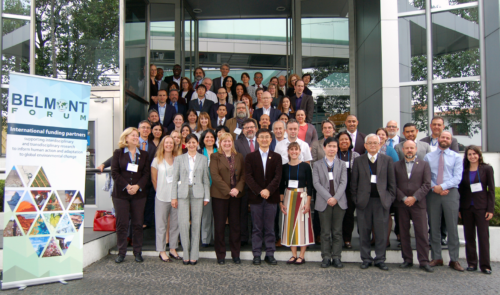
About the author
Alexandra Fries
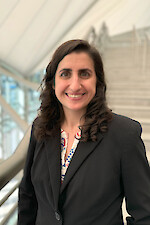
Alexandra is a Program Manager at the Integration and Application Network (IAN) based at the University of Maryland Center for Environmental Science in Annapolis MD. Alexandra’s work in environmental management has been focused on assessment, monitoring, and management of aquatic, marine, and terrestrial ecosystems. Alexandra has extensive experience in data analysis, synthesis, mapping, interpretation, and communication. Alexandra has experience working with a diverse group of partners including those in local, state, and federal government, non-governmental organizations, non-profit organizations, private industry, and academia. Within IAN, Alexandra conducts data analysis, synthesis, and communication by completing environmental report cards, updating the IAN website, and conducting science communication courses. Alexandra also creates science communication materials such as diagrams, posters, presentations, newsletters, and reports using Adobe Creative Suite, Microsoft Office Suite, and ArcGIS. Alexandra has experience managing projects and staff on local and international projects, liaising directly with partners and colleagues, and providing insights on project direction and goals.
Next Post > Integrate, Apply and Network
Comments
-
jasmine 7 years ago
this is very ineresting to read, thank you for sharing this post.